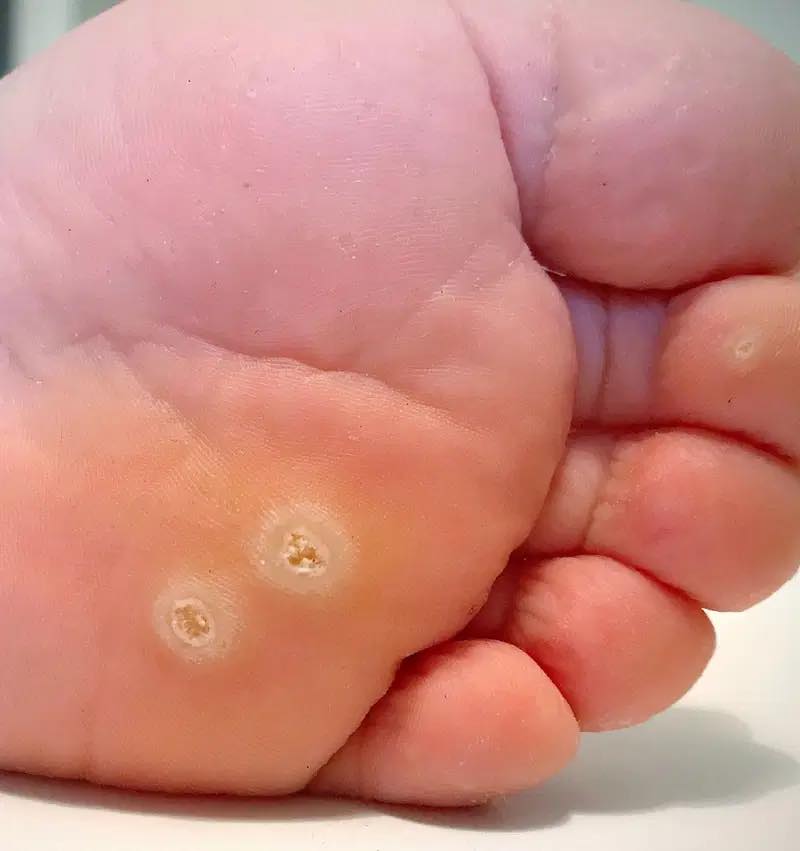Got rough, thickened skin on my feet. No podiatrist availability soon. Any ways to reduce discomfort?
Understanding Corns and Calluses
Calluses and corns are areas of thickened skin that develop as a protective response to friction and pressure. Corns tend to be smaller and can be painful, often forming on the tops and sides of toes. Calluses usually form on the soles of the feet, particularly the heel or ball of the foot. Though they are not harmful, they can cause discomfort and may lead to other foot issues if not managed properly.

Common Causes of Thickened Skin on Feet
Thickened skin on the feet is commonly caused by repeated friction and pressure. This can be due to wearing ill-fitting shoes, walking barefoot, or engaging in activities that put stress on the feet, such as running or standing for long periods. Other factors are foot deformities, such as bunions or hammertoes, and certain medical conditions like diabetes or arthritis that can affect foot health.Buy vitamins and supplements
Immediate Steps to Relieve Discomfort
In order to relieve discomfort from thickened skin, soak your feet in warm water for 10-15 minutes to soften the skin. Gently rub the affected area with a pumice stone or foot file to remove some of the excess skin. Be careful not to overdo it, because this can lead to irritation. Afterward, apply a moisturizing cream or lotion so as to keep the skin hydrated. Consider using cushioned pads or insoles in your shoes to reduce pressure on the affected areas.
Home Remedies for Softening Rough Skin
Certain home remedies can help to soften rough skin on the feet. Soaking feet in a mixture of warm water and Epsom salts can help to reduce inflammation and soften the skin. Applying a mixture of lemon juice and glycerin, or using a paste made from baking soda and water, can also be effective. Regularly moisturizing with natural oils, such as olive or coconut oil , can help maintain skin softness.
Over-the-Counter Treatments for Corns and Calluses
There are a variety of over-the-counter treatments available for corns and calluses. Salicylic acid pads or gels can help to dissolve the thickened skin over time. These should be used with caution, especially if you have sensitive skin or a condition like diabetes. Foot creams containing urea can also be effective in softening and reducing calluses. Ensure to follow the instructions on any product you use to avoid irritation.
Proper Footwear to Prevent Further Irritation
Wearing proper footwear is essential in preventing further irritation and the development of corns and calluses. Choose shoes that fit well, provide adequate support, and have a wide toe box to reduce pressure on the toes. Avoid high heels and shoes with narrow fronts. Consider using orthotic inserts or cushioned insoles to provide additional support and comfort.
When to Seek Medical Attention
Though home remedies and over-the-counter treatments can be effective, there are times when medical attention is necessary. If you experience severe pain, signs of infection (such as swelling, redness, or pus), or if the thickened skin does not improve with treatment, consult a healthcare professional. People with diabetes or circulatory issues should seek medical advice before attempting to treat foot problems on their own.
Preventive Measures for Long-Term Foot Health
In order to maintain long-term foot health and prevent the recurrence of thickened skin, practice good foot hygiene by washing and moisturizing your feet daily. Keep your toenails trimmed to prevent additional pressure on the toes. Regularly inspect your feet for any changes or signs of irritation. Engage in foot exercises to improve circulation and strength. Lastly, be sure you wear appropriate footwear for different activities to minimize stress on your feet.Buy vitamins and supplements


